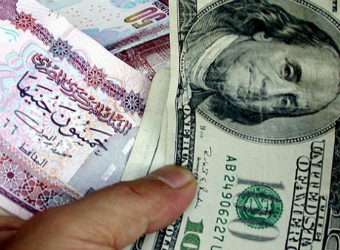The relative growth of foreign investment and the sharp decline of foreign exchange black market are among the fruitful results of Egypt’s full currency floatation a year ago, said local experts.
Egypt decided last year to fully float its local currency to contain shortage of the U.S. dollar reserves and embark on a strict three-year economic reform program.
Suffering economic slowdown over the past few years from political turmoil and security challenges, the floatation of Egyptian pound encouraged the International Monetary Fund (IMF) to support Egypt’s economic reform by providing a 12-billion-dollar loan, a third of which has been delivered to the North African country.
“The pound floatation led to the gradual vanishing of the black market and unified the exchange rate, which encouraged foreign investment in Egypt,” said Fakhry al-Fiky, economic analyst and former assistant to IMF executive director.
“It encouraged international financial institutions like the IMF and the World Bank to finance Egypt’s economic reform program, which shows confidence in the Egyptian economy and improves Egypt’s credit rating worldwide,” Fiky told Xinhua.
In mid-September, global rating agency Moody provided a “B3 stable” outlook of the Egyptian credit rating, noting that “Egypt benefits from strong reform momentum; very weak government finances remain key challenge.”
Egypt struggles to make up for a budget deficit of about 380 billion Egyptian pounds (21.5 billion U.S. dollars) that represents 10.8 percent of GDP, amid total foreign debt that rose by 42 percent to reach 79 billion dollars in the 2016-17 fiscal year and domestic debt that mounted to 3.05 trillion Egyptian pounds by the end of 2016.
However, the Word Bank expected Egypt’s budget deficit to decline from 10.8 percent to 8.8 percent in the ongoing 2017-18 fiscal year.
The governor of the Central Bank of Egypt (CBE) said that Egypt’s foreign debt was still “within the safe amounts as per international standards.”
Egypt’s fiscal year starts in early July and ends in late June.
“The reform program started to bear fruits, as it restored confidence in the Egyptian economy, returned remittances of expatriates to the banking sector instead of the black market, increased exports and decreased imports, boosted balance of trade and improved foreign investment,” said the expert.
The country’s reform program is based on austerity measures including fuel and energy subsidy cuts and tax increases, which improved Egypt’s foreign currency reserves that rose from 19 to 36.5 billion dollars in a year although it led to massive price hikes and increased inflation rate to 33.2 percent by the end of September 2017.
Accordingly, the country has been able to pay 16.8 billion dollars of its due foreign debts since the pound floatation in November last year and is planning to pay an extra 8.1 billion by the end of this year including 5.2 billion to African Export-Import Bank (Afreximbank), according to a previous statement of CBE Governor Tarek Amer.
Egypt announced Thursday to pay neighboring Libya an installment of 250 million dollars to complete a total payment of 1.5 billion dollars out of a 2-billion-dollar loan borrowed in March 2013. A day before, it paid Turkey the last 200-million-dollar installment of a 1-billion-dollar loan borrowed in October 2012.
“Generally, the performance is good and the economic reform program has obviously been successful so far,” said Gamal Bayoumi, head of the Cairo-based Arab Investors Union.
Although the floatation policy raised the dollar exchange rate from about 8 to 20 pounds in the beginning until it gradually declined to less than 18 pounds, Bayoumi believed that the stability of the current exchange rate was a major factor for encouraging foreign investment.
Egyptian Trade and Industry Minister Tarek Kabil said in late October that the trade deficit declined by 33 percent, from 34.86 to 23.39 billion dollars, during the first nine months of 2017 compared with the year before.
“The move increased exports and decreased imports because it created competitiveness for Egyptian domestic products,” Bayoumi told Xinhua, lamenting that the pound floatation and the economic reform program should have started two years earlier.
“Although a bit late, it is still fruitful and in the right direction,” said the Arab Investors Union chief.
Source: Xinhua


